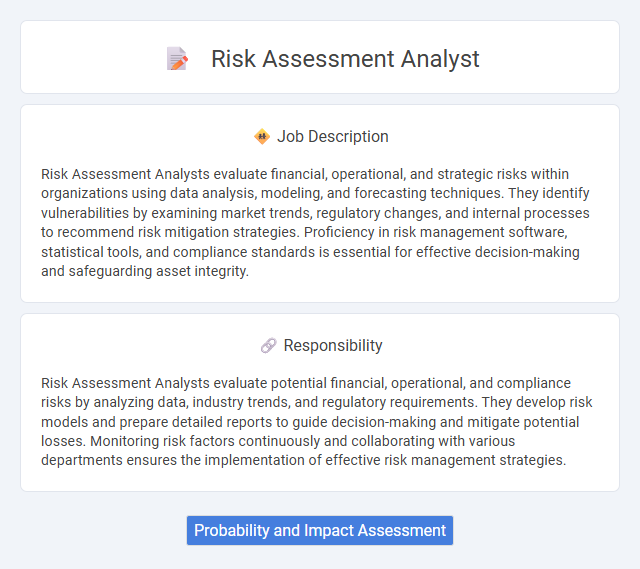
Risk Assessment Analysts evaluate financial, operational, and strategic risks within organizations using data analysis, modeling, and forecasting techniques. They identify vulnerabilities by examining market trends, regulatory changes, and internal processes to recommend risk mitigation strategies. Proficiency in risk management software, statistical tools, and compliance standards is essential for effective decision-making and safeguarding asset integrity.
People with strong analytical skills and attention to detail are likely suitable for a Risk Assessment Analyst role, as the job requires evaluating potential threats and vulnerabilities. Those who can handle high-pressure situations and make data-driven decisions may have a higher probability of success in this field. Conversely, individuals who struggle with complex problem-solving or prefer less quantitative work might find the role challenging.
Qualification
A Risk Assessment Analyst typically holds a bachelor's degree in finance, economics, statistics, or a related field, with certifications such as CFA, FRM, or CRM enhancing their credentials. Proficiency in data analysis software like SQL, Python, or SAS is essential, alongside strong knowledge of risk management frameworks and regulatory requirements. Analytical skills, attention to detail, and experience in quantitative risk modeling are crucial qualifications for accurately evaluating potential financial and operational risks.
Responsibility
Risk Assessment Analysts evaluate potential financial, operational, and compliance risks by analyzing data, industry trends, and regulatory requirements. They develop risk models and prepare detailed reports to guide decision-making and mitigate potential losses. Monitoring risk factors continuously and collaborating with various departments ensures the implementation of effective risk management strategies.
Benefit
Risk Assessment Analyst roles likely offer strong benefits such as enhanced decision-making skills that improve organizational security and reduce financial losses. Candidates may experience career growth opportunities through exposure to diverse industries and complex risk scenarios. There is a probable increase in job stability due to the rising importance of risk management across sectors.
Challenge
Risk Assessment Analysts likely face the challenge of accurately identifying and quantifying potential risks in dynamic environments. They may need to balance incomplete data and evolving threats, which could complicate decision-making processes. Navigating regulatory changes and ensuring compliance might also present ongoing difficulties in their role.
Career Advancement
Risk Assessment Analysts specialize in identifying and evaluating potential risks to help organizations make informed decisions and protect assets. Mastery of data analysis, risk modeling, and industry-specific regulations enhances career growth opportunities, leading to roles such as Senior Risk Analyst, Risk Manager, or Chief Risk Officer. Continuous skill development in emerging technologies and certifications like FRM (Financial Risk Manager) significantly accelerates advancement in this dynamic field.
Key Terms
Probability and Impact Assessment
Risk Assessment Analysts specialize in evaluating the probability and impact of potential threats to organizations by analyzing data trends, historical incidents, and risk factors. They utilize quantitative and qualitative methods to prioritize risks based on likelihood and potential consequences, ensuring strategic decision-making and resource allocation minimize vulnerabilities. Expertise in probability modeling and impact analysis enables these professionals to develop comprehensive risk mitigation plans that protect assets and support regulatory compliance.
 kuljobs.com
kuljobs.com